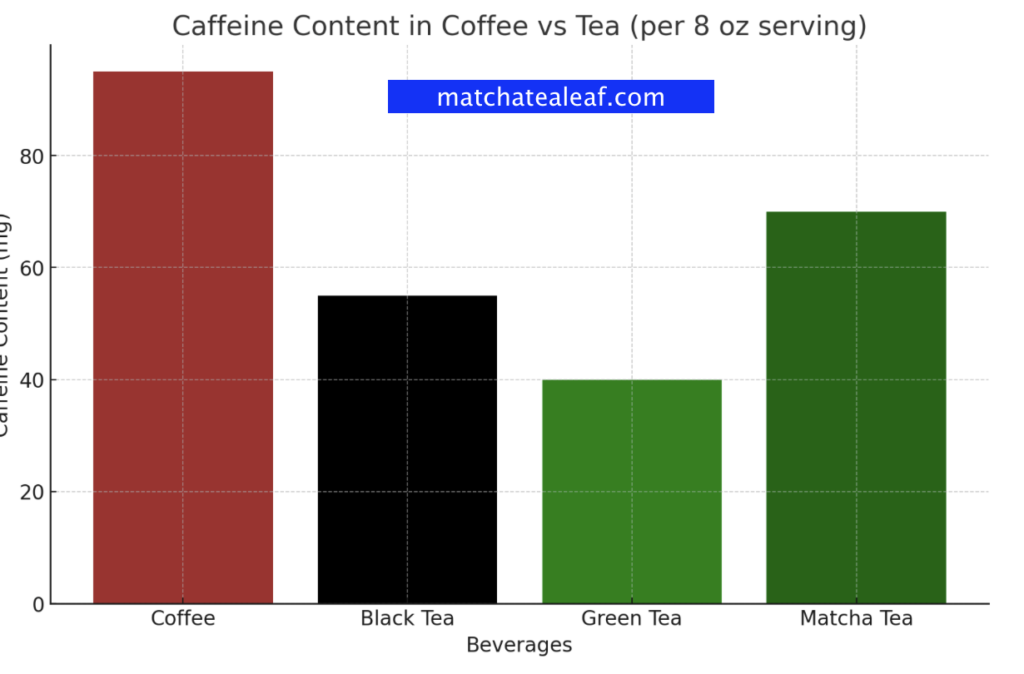Caffeine, a natural stimulant found in various plants, is consumed worldwide primarily through coffee and tea-black tea, green tea,matcha tea. These beverages, integral to many cultures and daily routines, differ significantly in their caffeine content and the way this caffeine affects the body. Understanding the differences in caffeine intakes via matcha tea vs coffee is crucial for health or dietary reasons.
Caffeine Content: Black Tea vs Matcha Tea vs Coffee
Generally, coffee contains more caffeine than tea. A typical 8-ounce (240-milliliter) cup of coffee can offer about 80 to 100 milligrams of caffeine, whereas the same amount of black tea provides approximately 40 to 70 milligrams. A typical 8-ounce (240-milliliter) serving of Matcha tea contains approximately 70 milligrams of caffeine. This amount can vary depending on factors such as the quality of the Matcha powder, the concentration used, and the specific brewing method.
For instance, Arabica coffee beans tend to have less caffeine compared to Robusta beans. Similarly, green tea usually contains less caffeine than black tea. The brewing time also plays a critical role: a longer brewing time can extract more caffeine, though this also depends on the temperature of the water and the grind size in the case of coffee.

Caffiene Absorption and Effects on the Body
The effects of caffeine from tea and coffee are not just about the quantity but also about the rate of absorption and other compounds present in these drinks.
i) Absorption of caffeine through Coffee
The caffeine in coffee is absorbed quickly, leading to a rapid spike in energy levels. This is why many people prefer coffee for an immediate wake-up call in the morning.
ii) Absorption through black tea
Ordinary teas, like black or oolong, contain less caffeine than coffee but more than green tea. Their caffeine is absorbed at a moderate pace, offering a balanced energy boost. Unlike coffee’s rapid effects, these teas provide a steadier stimulation without abrupt energy spikes or crashes.
iii) Match tea caffeine absorption
Matcha tea offers a unique experience in terms of caffeine absorption due to its distinct preparation and consumption method. Unlike other teas where leaves are steeped and then removed, Matcha involves whisking finely ground tea leaves into water, resulting in the consumption of the entire leaf. This comprehensive consumption means that drinkers receive the full complement of caffeine available in the leaves.
However, Matcha’s caffeine absorption is moderated by its high concentration of L-theanine, an amino acid that promotes relaxation without drowsiness. L-theanine works synergistically with caffeine to provide a sustained energy boost without the rapid spike and subsequent crash often associated with coffee. This results in a gradual release of caffeine, ensuring a prolonged, steady alertness.
Matcha Tea vs Coffee Caffeine : Health Benefits and Risks
Both coffee and tea offer various health benefits when consumed in moderation. Coffee has been associated with a reduced risk of diseases like Parkinson’s and Alzheimer’s, and some studies suggest it may lower the risk of type 2 diabetes. Tea, particularly Matcha tea, is rich in antioxidants and has been linked to a lower risk of heart disease and certain cancers.
However, excessive caffeine intake from either beverage can lead to negative side effects such as insomnia, nervousness, restlessness, stomach upset, rapid heartbeat, and muscle tremors. It’s also worth noting that some people are more sensitive to caffeine than others.
